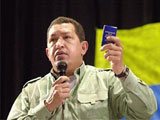Chavez's year of reckoning
By Samuel Logan for ISN
When the Venezuelan government announced on 5 January that it would suspend its program offering free heating oil to the poor in the US (though it later reverse this), it set the tone for what may be a very difficult year for President Hugo Chavez.
Currently selling at or below US$30 a barrel, Venezuelan heavy crude prices are at levels down some 70 percent since last summer. These revenues represent as much as 93 percent of the government's export income and at least half of its overall income. With little prospect for prices to rise in the coming months, many observers look to Venezuela and wonder how long Chavez can last, given his popularity is largely based on social programs funded by oil wealth.
Chavez's first test will come on 15 February when the country will vote on a referendum to allow or deny infinite re-election for the Venezuelan president. Many agree that it is unlikely Chavez will make any painful spending cuts before then. Regardless of the referendum's outcome, however, spending cuts are likely down the road.
Petróleos de Venezuela, SA (PDVSA), Venezuela's energy giant, remains the indicator for Chavez's impending financial struggles. Recently, the Royal Bank of Scotland canceled the company's credit line, according to Reuters and Upstream Online. Some 39 percent of PDVSA's accounts with suppliers remained unpaid at the end of 2008 - a sum of US$7.9 billion accrued between January and September of last year, according to Executive Analysis, a UK-based risk analysis company. The company also faces interest payments on debt totaling some US$2.3 billion.
Yet Chavez remains optimistic.
In mid-January, he announced plans for PDVSA to invest some US$125 billion in 88 projects between 2009 and 2014. There are strong indications that he will again court international oil companies for investment. On 16 January, he announced that he would siphon some US$12 billion from the Venezuelan Central Bank. He will likely use the money to continue funding of various social programs around the country, but the exact destination of these funds remains unclear.
According to Caracas-based economist Pavel Gomez, recently interviewed by The Associated Press, the remaining US$30 billion left in the Central Bank's international reserves "may not be sufficient to finance debt payments and dollar-denominated imports if the economic situation worsens."
Venezuela closed 2008 with an inflation rate at over 30 percent - the region's highest - and many economists believe inflation in the country will continue to climb in 2009.
After calculating the potential for Venezuela's economic malaise in 2009, some analysts consider that Chavez's regional programs that use cheap oil as a basis of geopolitical good will and influence will fall under financial pressure and soon dry up.
The Petrocaribe program, whereby Venezuela sells some 56,000 barrels of oil and diesel a day to around 20 Caribbean nations, has a cloudy future. The program allows participants to pay half for the oil and the other half falls under a financing program that gives debtors 25 years to pay off the balance.
Plans for PDVSA-funded oil refineries in Ecuador, Nicaragua and Panama may also show signs of stalling.
The company offers some 15,000 barrels of oil a day to Central American countries at discounted prices. Another 100,000 barrels of oil and oil products flow to Cuba every day, and PDVSA exports an undisclosed amount of diesel to Bolivia.
PDVSA doesn't have a strong cash flow, and financial markets lack the money to offer credit. As we move forward into 2009, a weakened Chavez may pull back from his position on the international stage and focus on what he holds most dear: his presidency.
Rankling the US government certainly remains part of that strategy. Perhaps this is why only days after announcing the closure of his oil-for-poor program in the US, Chavez decided to recant his decision and offer oil to the poor once more - a program that cost PDVSA some US$100 million in 2008.
Solidarity with the poor in the US may win him an enduring positive image in some places, but his "commitment amid adversity" position, as Global Insight calls it, will not last. This year will be one of reckoning for Chavez.

